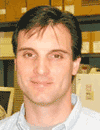|
Please note all times are listed in EST |
| |
10:00 | Setting up a scalable Bioinformatics Infrastructure for high-throughput biology
Sven Nahnsen, Head, University of Tuebingen, Germany
I will present recent developments and novel methods to overcome the demanding tasks for data and project management in NGS projects. Furthermore my talk will present production-scale implementations of bioinformatics workflows for (gen)omics data processing and analysis. Finally, I will present our solution towards a an digital, collaborative research environment allowing the integration of infrastructure, bioinformatics tools and (meta)data.
|
11:00 |  | Keynote Presentation The 100,000 Whole Genome Sequencing Project
Mark Caulfield, Chief Scientist, Queen Mary University of London, United Kingdom
The National Health Service has recognised the transformative potential for healthcare of the genetic variation within our DNA. The sequencing of 100,000 whole genomes from people with rare disease, cancer and infectious disease linked into their electronic medical records is designed to create a life course refreshable dataset that will transform the capability and capacity to apply Genomic Medicine in patient care. This will provide new opportunities for diagnosis and prime new therapeutic advances. It may produce new uses for old medicines and enable us to stratify patient response, getting the right treatment to the right patient offering opportunities for those afflicted by diseases which disable and shorten lives.
|
|
12:00 | Next Generation Sequencing for the Clinical Management of Patients with Oropharyngeal Squamous Cell Carcinoma
David Smith, Professor, Mayo Clinic, United States of America
We will describe how next generation sequencing will be transforming the clinical management of patients that have oropharyngeal squamous cell carcinoma (cancer of the base of the tongue, tonsils or larynx
|
13:00 | Using Next Generation Sequencing to Understand Pseudomonas Syringae Pv Actinidae, an Emerging Bacterial Pathogen of Kiwifruit
Iain Lamont, Professor, University of Otago, New Zealand
This presentation will cover the application of next generation sequencing technologies in understanding the spread and physiology of Pseudomonas syringae pv actinidae, a bacterial pathogen that infects kiwifruit plants and has had major effects on the kiwifruit industry. |
14:00 | Advancements in Next Generation Sequencing - an Unbiased View
Shawn Baker, Chief Science Officer/Chief Executive Officer, AllSeq Inc, United States of America
AllSeq’s Sequencing Marketplace offers a unique and unbiased look at what’s going on in next generation sequencing, with insights into the popularity and true cost of the various platforms and applications. An overview of the latest trends will be presented.
|
15:00 | The Bru-seq Technology Platform for Nascent RNA analysis
Mats Ljungman, Professor, University of Michigan, United States of America
I will present a set of novel techniques to analyze many aspects of gene expression based on the capturing of nascent RNA. I will show examples of how this platform of techniques allow for the analyses of synthesis and degradation of RNA, splicing kinetics, transcription elongation rates and mapping of active enhancer elements genome-wide in human cells. |

